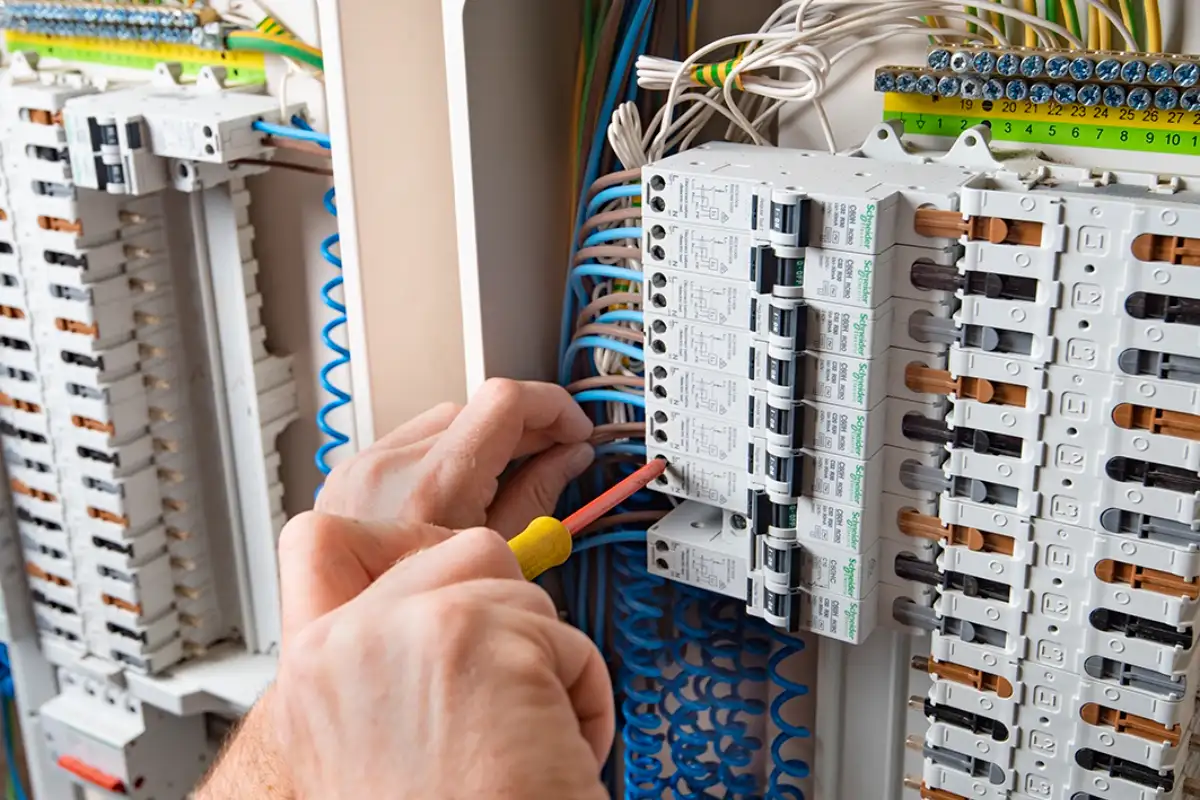Fixed Wire Testing (EICR)

What is Fixed Wire Testing?
Fixed Wire Testing, also known as an Electrical Installation Condition Report (EICR), involves a detailed assessment of the fixed electrical systems within a property. This includes examining the wiring, circuits, and other related equipment to ensure they are in safe working condition and comply with relevant safety standards.
Our certified technicians conduct various tests to identify faults, potential hazards, and deterioration. The purpose of Fixed Wire Testing is to prevent electrical accidents, ensure compliance with safety regulations, and maintain the overall integrity and safety of the electrical installation within the property.
Prevent Accidents & Costly Repairs
Regular Fixed Wire Testing is crucial for maintaining the safety and efficiency of electrical systems. It helps identify potential problems before they escalate into serious hazards, thus preventing accidents and costly repairs.
Adhering to a regular testing schedule can ensure that your property remains safe and compliant with all relevant electrical safety standards. Contact us today to schedule your Fixed Wire Testing and secure the safety of your electrical installations.
Enter Your Details And We'll Call You Right Back

Is Fixed Wire Testing a Legal Requirement?
Fixed Wire Testing is a legal requirement in many contexts, particularly for landlords, employers, and property managers. In the UK, regulations such as the Electricity at Work Regulations 1989 and the Health and Safety at Work Act 1974 mandate that electrical installations be maintained safely.
Regular Fixed Wire Testing, often performed through an Electrical Installation Condition Report (EICR), ensures compliance with these laws. Rental properties, commercial buildings, and public facilities must conduct these tests periodically to ensure the safety of occupants and the integrity of the electrical systems.
Is Fixed Wire Testing Expensive?
The cost of Fixed Wire Testing can vary depending on several factors, including the size of the property, the complexity of the electrical installations, and the number of circuits to be tested. While it may seem like a significant expense upfront, the long-term benefits of ensuring safety, preventing electrical accidents, and avoiding costly repairs far outweigh the initial cost.
Investing in regular Fixed Wire Testing can save money by identifying and addressing potential issues early, thereby maintaining the integrity and efficiency of your electrical systems. Contact us for a tailored quote based on your specific needs.
Who Is Responsible for an EICR Test?
The responsibility for conducting an Electrical Installation Condition Report (EICR) test typically falls on the property owner or landlord. For rental properties, landlords are legally required to ensure that the electrical installations in their properties are safe and maintained. This includes arranging regular EICR tests and addressing any issues identified in the reports.
Employers or property managers are responsible for ensuring electrical safety in commercial and public buildings. This includes scheduling and maintaining EICR tests to comply with health and safety regulations. Regular EICR testing helps maintain a safe environment for occupants and ensures compliance with legal standards.
Why is Fixed Wire Testing important?
Fixed Wire Testing is essential for ensuring the safety and reliability of electrical installations within a property. It helps identify hazards such as faulty wiring, poor connections, or deteriorating components that could lead to electrical shocks, fires, or equipment failures. Regular testing ensures compliance with legal safety standards, such as the Electricity at Work Regulations 1989 and the Health and Safety at Work Act 1974, which require electrical systems to be maintained safely.
Moreover, it provides peace of mind to property owners, landlords, and occupants by ensuring the electrical infrastructure is safe and functional. Early detection of issues through Fixed Wire Testing can also prevent costly repairs and downtime by addressing problems before they escalate.
How Often Should Fixed Wire Testing Be Carried Out?
The frequency of Fixed Wire Testing, also known as EICR (Electrical Installation Condition Report), depends on the type of property and its usage. For residential properties, it is recommended every ten years or at the change of occupancy. Rental properties should be tested every five years or at the start of a new tenancy.
Commercial properties generally require testing every five years, while industrial properties may need more frequent assessments, typically every three years. High-risk environments, such as swimming pools or medical facilities, often require annual inspections to ensure safety and compliance with regulations.
Regular Fixed-Wire Testing helps maintain the safety and integrity of electrical installations, prevent hazards, and ensure legal compliance.

I couldn’t be happier with PAT Man Company. They were efficient and friendly, making the whole process stress-free. We will use their services again!
Sarah Brown
Sheffield
Outstanding service from PAT Man Company! Their knowledgeable and courteous team ensured all our electrical appliances were safe and compliant.
Mark Taylor
Rotherham


